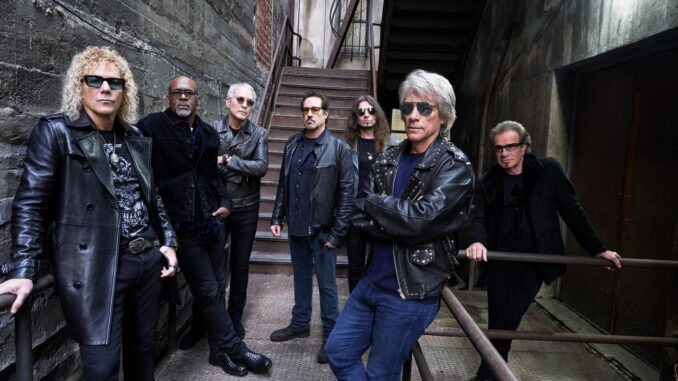
Bon Jovi Rocks On — The Legendary Band’s Spirit, Sound, and Legacy Live Forever
Few bands have captured the essence of American rock ’n’ roll quite like Bon Jovi. From the neon glow of the 1980s to the digital pulse of the modern era, the group has not only survived but thrived — evolving while staying true to the spirit that made them icons. Led by charismatic frontman Jon Bon Jovi, this New Jersey-born band has transcended musical trends and generational shifts, forging a legacy built on powerful anthems, relentless energy, and an unshakable connection with fans worldwide.
The Rise of a Rock Phenomenon
Bon Jovi’s story began in 1983, when Jon Bon Jovi, a young dreamer from Sayreville, New Jersey, assembled a band that would soon redefine rock music’s mainstream appeal. Alongside guitarist Richie Sambora, keyboardist David Bryan, bassist Alec John Such, and drummer Tico Torres, Jon crafted a sound that blended hard rock grit with pop sensibility — a combination that would take them from small clubs to stadiums around the world.
Their self-titled debut album, Bon Jovi (1984), gave them their first taste of success with the single “Runaway,” but it was their third record, Slippery When Wet (1986), that catapulted them to superstardom. Packed with hits like “Livin’ on a Prayer,” “You Give Love a Bad Name,” and “Wanted Dead or Alive,” the album became a defining moment in ’80s rock history. It was the perfect storm of catchy hooks, big choruses, and relatable lyrics — songs about love, struggle, and chasing dreams that resonated across generations.
The Spirit of Resilience
What truly sets Bon Jovi apart from their peers is their resilience. While many ’80s rock acts faded into nostalgia, Bon Jovi continued to reinvent themselves without losing their identity. Albums like New Jersey (1988) solidified their dominance, offering deeper themes and showcasing the band’s growth as songwriters. When musical tastes shifted in the 1990s toward grunge and alternative rock, Bon Jovi didn’t disappear; instead, they evolved. Their 1992 album Keep the Faith marked a mature, introspective turn, reflecting the realities of a band growing older but not losing their passion.
Jon Bon Jovi’s leadership has been central to that endurance. Known for his tireless work ethic and unwavering optimism, he guided the band through lineup changes, personal challenges, and the changing tides of the music industry. His partnership with Richie Sambora — until the guitarist’s departure in 2013 — was especially instrumental. Together, they penned some of rock’s most enduring anthems, their chemistry balancing raw emotion with irresistible melody.
Sound and Style: The Bon Jovi Formula
At its core, Bon Jovi’s music embodies hope, resilience, and the power of the human spirit. Their songs are built around universal themes — love, struggle, perseverance, and triumph. Whether it’s the working-class anthem “Livin’ on a Prayer” or the reflective “It’s My Life,” their music speaks to anyone who’s ever chased a dream or faced adversity.
Musically, Bon Jovi blends hard rock’s intensity with pop’s accessibility. Richie Sambora’s soulful guitar work, Tico Torres’ thunderous drumming, and David Bryan’s rich keyboard textures give the band a distinctive sonic identity. Jon’s vocals — soaring, passionate, and instantly recognizable — serve as the emotional anchor. Over the years, they’ve incorporated elements of country, acoustic rock, and even modern pop production, ensuring their sound remains fresh without alienating longtime fans.
Beyond the Music: A Legacy of Compassion
Bon Jovi’s legacy extends far beyond their albums and sold-out tours. Jon Bon Jovi himself has become a symbol of philanthropy and community service. Through the Jon Bon Jovi Soul Foundation, he has championed causes like homelessness, hunger relief, and affordable housing. The Soul Kitchen restaurants, where patrons can “pay what they can,” embody the band’s belief in empathy and human connection — values that have always been at the heart of their music.
This sense of authenticity has endeared Bon Jovi to fans for over four decades. Their concerts are not just performances but communal experiences — massive sing-alongs that remind audiences of the enduring power of rock music to unite and uplift. Even after Richie Sambora’s departure, Jon and the band continued to carry the torch, releasing albums like This House Is Not for Sale (2016) and 2020, which addressed themes of social change, resilience, and hope in uncertain times.
Enduring Influence
Bon Jovi’s impact on modern rock cannot be overstated. They helped bridge the gap between glam metal and mainstream pop, influencing countless artists who followed. Bands from Nickelback to The Killers have cited Bon Jovi’s blend of melody and message as inspiration. Moreover, their ability to remain relevant across generations is a testament to their adaptability and universal appeal.
Their induction into the Rock and Roll Hall of Fame in 2018 was a well-deserved recognition of a career built on passion, perseverance, and purpose. Yet, for Jon Bon Jovi, the honor was less about accolades and more about the fans who made the journey possible. “It’s about the people who sang these songs with us for 35 years,” he said — a reflection of his humility and gratitude.
The Legacy Lives On
As Bon Jovi continues to tour, record, and inspire, their message remains as clear as ever: keep the faith, live with purpose, and never stop believing in your dreams. Their music stands as a soundtrack for generations — from rebellious teenagers in the ’80s to adults who find comfort and motivation in their lyrics today.
“Rock ’n’ roll isn’t just about guitars and drums,” Jon Bon Jovi once said. “It’s about heart.” That heart continues to beat strong — in the songs that fill arenas, in the charitable work that changes lives, and in the timeless connection between the band and its fans.
More than four decades since their debut, Bon Jovi still rocks on — living proof that passion, authenticity, and belief in the power of music can make legends truly immortal.
Leave a Reply